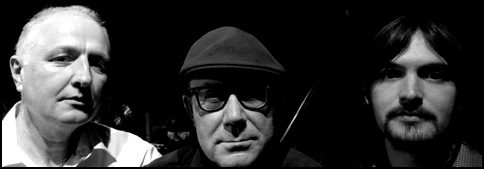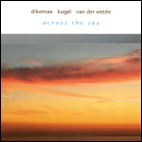
photo © Andy Moor
selected cd reviews:
tomajazz.com
thejazzword.blogspot.de
enola.be
jazzenzo.nl
draaiomjeoren.blogspot.nl
grisli.canalblog.com
hisvoice.cz
improv.hu
jazzquad.ru
italia.allaboutjazz.com
writteninmusic.com
____________________________________________________________
"Over the last few years the American saxophonist John Dikeman has become one of the young figureheads of Dutch jazz and improvised music. He’s known for his boundless energy, as a person and as a musician, and that’s reflected in his diverse projects and ferocious sound. Also in this band, Dikeman shows himself to have many sides. The trio works from probing explorations to fortresses of sound. Still, these climaxes aren’t the most intense moments. At any time during this hour long recording, listening is central, each member feeling which sound the group needs, thus guaranteeing intense empathy for the whole hour. The last of the three pieces is wonderful. Dikeman almost stoically hangs in the same atmosphere, winning only in volume, while drummer Klaus Kugel and sound magician Raoul van der Weide drive the symbiosis to trance-like heights. The 25 minute long ‘A Screaming Comes’ sweeps you from sparse percussion and Eastern sounding wind sections to a swinging jazz groove or free jazz explosions from which the characteristic gurgling and sometimes spastic sounding screams of Dikeman issue forth. There’s hardly room to breathe. But most fascinating of all is the colour that the trio as a whole creates. The combination of Van der Weide’s crackle box and numerous sound objects with the restless drumming and Dikeman’s famous sax timbre is as solid as a rock, while never stating the obvious. The thirst for adventure and (new) sound amalgamations makes for a bloodcurdling trip with a constant supply of new things to be discovered."
- Tim Sprangers, Gonzo (circus), 2012
____________________________________________________________
"From a record whose titles are taken from the opening lines of Thomas Pynchon’s legendary Gravity’s Rainbow, one might expect to find the “Big Book of Postmodern Tricks” executed with all kinds of intellectual gibberish and erudite references, but that doesn’t happen here at all. Across the Sky is an extremely coherent hour of music from a trio that sounds like old friends that are completely at ease with each other.
It is also refreshing to hear John Dikeman outside of the context of the roaring Cactus Truck or the XL-ensemble Royal Improvisers Orchestra. Here we have the American expat who moved to the Netherlands with quite a few detours on the way, returning to his true roots: free jazz rooted in the blues. For this he’s found fine partners in German drummer Klaus Kugel, who flourished alongside Theo Jörgensmann, toured frequently with Steve Swell and Vyacheslav Ganelin, and has more lately been featured on two albums from the international group Undivided. Van der Weide has a slightly narrower discography, but has the longest career (as a musician and visual artist) and a highly individual style that means he’s just as capable of swinging as of making use of all sorts of attachments.
The main weight of the album is in the opener “A Screaming Comes,” a twenty-five minute demolition derby that starts out with clanging percussion and plucked strings, but, led by Dikeman, quickly increases in energy and intensity. In contrast to the instant violence of Cactus Truck, here it’s smoother and more controlled, and it takes a while before the saxophonist begins a haunting lament that seamlessly connects the work of Albert Ayler with the surprisingly subdued, almost drone-like interplay of Van der Weide and Kugel. The latter shows here, as with Undivided, how he’s constantly occupied with free timing while still embuing the performance with an hypnotic flow.
Van der Weide can boast a wide range of techniques, from abrupt pizzicato and unusual techniques to whirlwind lines that push Dikeman into high gear. The saxophonist has no problem with that and puts fire to the fuse with the Old Testament fury that Charles Gayle displays on his best trio records. More than improvisation or free jazz you hear übergospel: reeling with religious conviction and tortuous dynamism, with roaring pounding in the low register, split tones and a timbre that is almost torn to pieces. Hard and heavy, but also with a control which proves he is more than a one trick pony.
The two subsequent pieces, “across the sky.” and “It has happened before...” don’t have the same narrative knockout, which is mainly due to a more open, capricious approach, with a stronger emphasis on unusual playing techniques and contrast. ‘Across the sky’ begins with a long sax-free intro in which van der Weide in particular is busy with all sorts of scrabbling, dragging and rattling, while Kugel confines himself to lightly humming cymbals. Dikeman makes his sputtering entrance after a few minutes, and after a simultaneous building of tension with Kugel ensures that the second half once again deals out a fiery free jazz hand.
The final piece, “It has happened before’, goes further than its predecessor. Van der Weide employs a crackle box and all sorts of objects for the whole number, creating a strange blend that makes Dikeman’s ripping litanies sound even more bad-tempered than they did before. What’s so clever is that it all happens collectively, right up to the amusing unisons in the finale. It also goes to show that improvisation in particular is a world where like-minded musicians of different generations (born in 1949, 1959 and 1983) are willing to pull the same way without lapsing into predictability. Across the Sky is definitely worth the discovery and further evidence of the Not Tow label’s good musical nose."
- Guy Peters, Enola, 2012, Belgium

Альбом Across The Sky – плод совместного творчества трех представителей европейской фри-джазовой сцены – тенор-саксофониста из Амстердама, американца по происхождению Джона Дайкмэна, немецкого барабанщика Клауса Кугеля (целый ряд альбомов, записывавшихся с его участием можно найти на наших страницах) и еще одного представителя Голландии, басиста Рауля ван дер Вейде, который здесь отвечал также за разнообразные звуковые эффекты.
Если бы речь шла о мэйнстриме, не говоря уже о свинговом джазе и еще более традиционных джазовых формах, такой состав заранее определил бы характер музыки: безраздельное царство саксофона и тактично поддерживающая его ритм-группа. Но, ребята, это фри-джаз, и при том наикрутейший, и тут дела обстоят совсем иначе…
При том внешне может показаться, что вышеописанная схема действует и здесь. На протяжении практически всей длиннейшей (25 минут!) стартовой композиции A Screaming Comes именно Дайкмэн находится на авансцене, именно его саксофон рычит, стонет, визжит, кричит (смысловой ряд глаголов можно продолжить по усмотрению). Но вот Кугель и ван дер Вейде при этом упорно и последовательно гнут каждый свою линию, вовсе не подстраиваясь под звучание коллеги, а лишь чутко реагируя на его реплики и отвечая своими – это не монолог с сопровождением, а оживленная беседа трех равноправных участников. Графически тут наиболее точно можно изобразить ситуацию в виде равностороннего треугольника, где каждая вершина и каждая сторона одинаково важна. Та же схема справедлива и для двух остальных пьес альбома - Across The Sky и It Has Happened Before. Сложно, головоломно и….захватывающе интересно, если, конечно, вам в принципе не противопоказан тотальный фри.
О чем эта музыка? Это зависит от вашего воображения. Можно прочесть очень философскую версию автора liner notes Джеффа Кайзера. Можно обратить внимание на недвусмысленно заявленную авторами на тыльной стороне обложки альбома связь названий пьес с романом Томаса Пинчона «Радуга земного тяготения». Увы, все знать невозможно: до сих пор я не слышал об этой книге и этом писателе. С горящими от стыда ушами залез в сеть, прочел, скачал.
Оказалось, что Пинчона считают крупнейшим постмодернистом второй половины ХХ века, а «Радугу земного тяготения» по сложности, многослойности, обилию подтекстов и зашифрованности повествования сравнивают с джойсовским «Улиссом». Что ж, уважаемый слушатель этого альбома, у вас и тут полная свобода (опять это слово!) выбора собственной версии. А я, поставив в очередной раз диск с Across The Sky , принимаюсь за чтение Томаса Пинчона….
Леонид АУСКЕРН


